The forex market is in the midst of a period of unprecedented volatility. Volatility means two things—massive profit opportunities and significant risk.
One way to minimize risk is to choose a regulated forex broker. Regulated brokers are closely monitored by various government agencies and are far and away the safest way to begin trading forex.
Although all regulated brokers are safe, they can differ in other respects, and some offer distinct advantages over their competition. In my search for the best regulated forex brokers, I have opened a number of accounts and made many trades, in addition to consulting with a lot of other forex traders. Here’s the result of my work:
Table of Contents
My top pick: Forex.com — 9.4/10 (Best forex broker for US clients)
Forex.com is my top choice because they incorporate all the complex tools necessary for forex trading into a very simple trading platform. Whatever your level of expertise, you can thrive with Forex.com.
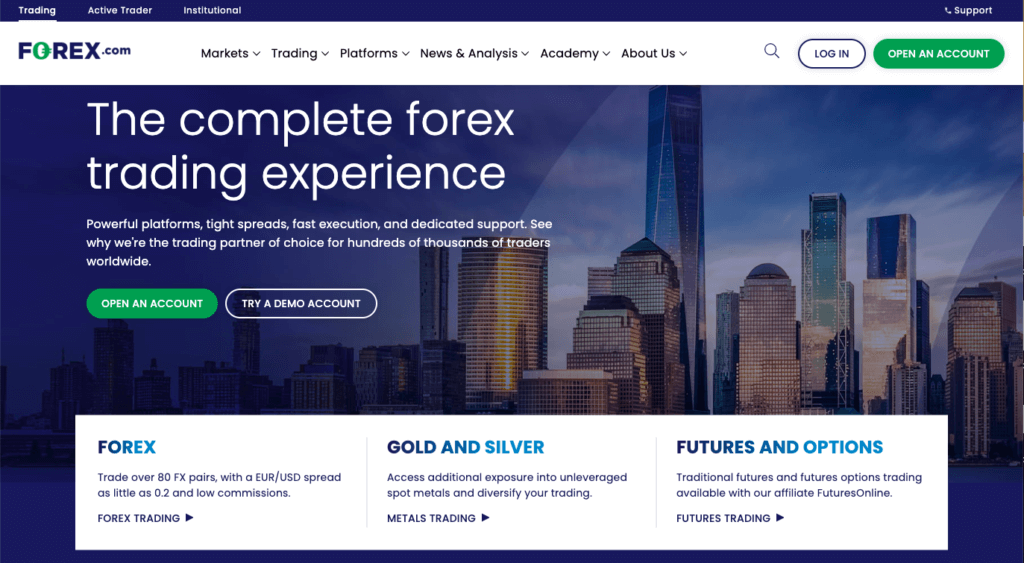
Pros
With a name like Forex.com, you can assume they have one principle focus. That dedication has led to a truly outstanding trading platform that offers an incredible array of charting and drawing tools in addition to as much market analysis as you can safely digest. It’s a platform that was clearly designed by forex traders themselves. I can’t think of a single trading tool that Forex.com is missing. It’s the complete package.
Perhaps even more impressively, Forex.com managed to fit all of that into their mobile trading app. If you plan on doing any trading in the wide world beyond your office, Forex.com offers the complete suite of trading tools in the palm of your hand. This might not seem quite as impressive to the younger generation, but I’m old enough to remember when that much trading power took an entire back office room full of computers. Now it’s on your phone.
Even if you use MT4, a forex-trading platform that allows you to trade with almost any broker, Forex.com has exclusive add-on tools to enhance your trading experience.
Forex.com has also made significant investments in analytics and algorithms. Their SMART Signals engine is one of my favorite trade idea generators. SMART Signals filters mountains of historical price data to identify trade opportunities and even share past success rates for traders who acted on these opportunities. Obviously past performance doesn’t guarantee future results, but on those days when I feel overwhelmed by what’s going on in the market, past precedence can give me the confidence to jump in and execute my trading strategy.
If security is your main priority in choosing a forex broker, Forex.com is about as secure as it gets. In addition to having more than half a million traders worldwide, they have been around for more than 20 years and are owned by a publicly traded company with $11 billion in assets. US traders may be keen to know that Forex.com has been entrusted with more client assets than any other forex broker.
And, of course, forex.com is heavily (and I mean heavily) regulated through the various financial authorities in the US, UK, Canada, Australia, Singapore, and other countries.
Finally, and this is by no means an afterthought, Forex.com has some of the lowest trading costs in the industry. They accomplish this by offering several different account types that allow you to choose what would be personally most affordable to you based on your trading style. There’s also an active trading program that offers rebates that can amount to a 15% discount on your trading costs.
Cons
The one strike against Forex.com is something you will unfortunately hear about with most of the larger forex brokers: Their customer service department can be difficult to work with.
All regulated forex brokers have to follow strict identity verification protocols when signing up new traders and authorizing withdrawals. The vast majority of the time, these pose no problem. But where Forex.com (and most of their competitors) get into trouble is when there is some sort of hiccup in the verification process.
If your account is red-flagged for whatever reason, customer service can take forever to get to the bottom of things and finally authorize your deposit or withdrawal. Doesn’t happen to many people, but if it happens to you, it can be very frustrating.
Overall
Whatever your level of forex expertise, Forex.com increases your potential for success by providing every trading tool you could possibly need wrapped into the best trading platforms and with some of the lowest trading costs. If you’re ready to start trading forex, start trading with the best.
My runner-up: IG — 9.3/10
IG is the OG of regulated forex brokers. They’ve been at this a long time, and that experience is evident in their stellar trading platforms, cheap trading costs, and outstanding customer service.
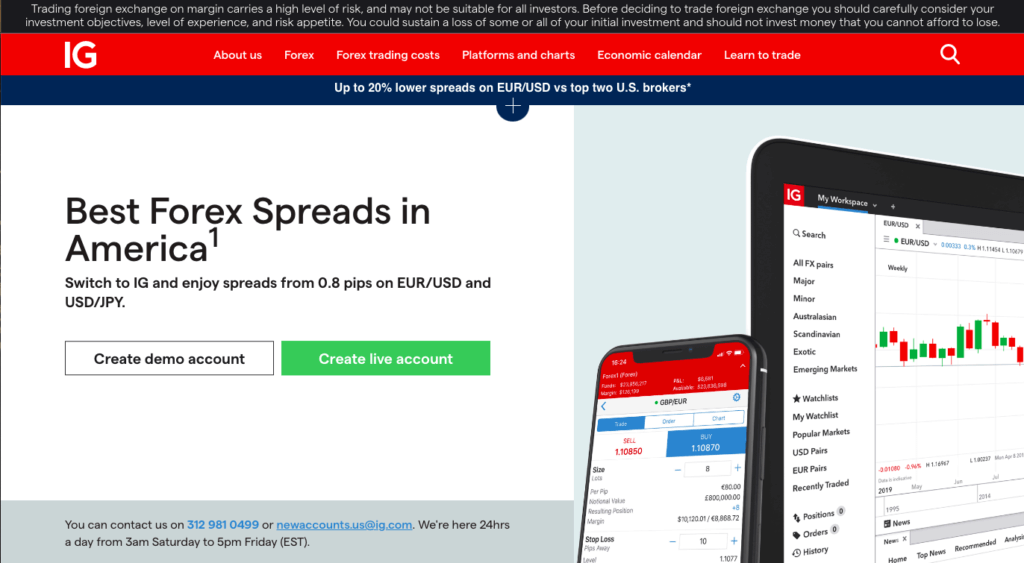
Pros
IG doesn’t offer flexible pricing options like Forex.com does, but if you want to keep it simple, IG offers slightly lower spreads across the board in my recent experience. There’s not an enormous difference, but if you’re executing a high-volume trading strategy, even marginally lower spreads can make a big difference in profits over the long run.
I also think that of all the regulated forex brokers, IG has the best customer service department. That might not be significant to the experienced trader, but for those of you just starting to trade forex, it’s nice to have reliable help. IG also seems to have less sign-up and withdrawal issues than their competitors. In the event of verification issues, IG is quicker to get things back on track.
IG has also put together an outstanding trading education program. The IG Academy is a great place for new forex traders to get initiated, and one or two live webinars a day keep all traders up to speed on current market traditions.
A stellar (by forex broker standards) customer service department coupled with great educational resources tells me that IG is highly invested in their traders’ success.
There are a lot of brokers out there, particularly offshore forex brokers, who don’t seem overly concerned with trader retention. They go after that initial deposit, but don’t offer new clients the support they need to become professional, profitable traders. IG, on the other hand, seems far more invested in developing long-term trader relationships. If you want forex trading to be an ongoing income source, IG is a great place to start.
And, of course, like every broker on this list, IG is beyond safe. They’ve been in business since 1974, are publicly traded on the London Stock Exchange, and are regulated in the US, UK, Europe, and beyond. You know those sliding doors that everyone always accidentally runs into because they can’t see them—not as transparent as IG.
Cons
As far as trading platforms go, IG has a mobile platform that has a 4.7 rating (from more than 4,000 traders) in the Apple App store, and a desktop platform that has won its share of awards. The problem? It just doesn’t do it for me.
That is pretty vague and personal, I know, and I can’t even really put my finger on it, but of all the forex-trading apps I’ve used, IG’s seems the least user friendly. Or maybe I should say Michael friendly. There’s a ton of charting options, but I found them difficult to manipulate. Even the trade screen is too busy for my tastes.
IG is also, at least in the US, all in on forex. They have other offerings available to non-American traders, but in the US forex trading is currently your only option. That’s great if foreign exchange is your only focus, but if you’re at all interested in other financial markets, look elsewhere.
Overall
IG is a secure broker with great spreads and probably the best customer service of any forex broker I’ve experienced. Open a demo account and try out their trading platforms. If they suit your needs more than mine, you can’t go wrong with IG.
#3 AvaTrade — 9.1/10
AvaTrade is not available to US clients, but AvaTrade is amongst the best forex brokers in the world due to user-friendly trading platforms, commitment to innovation, and great customer service.
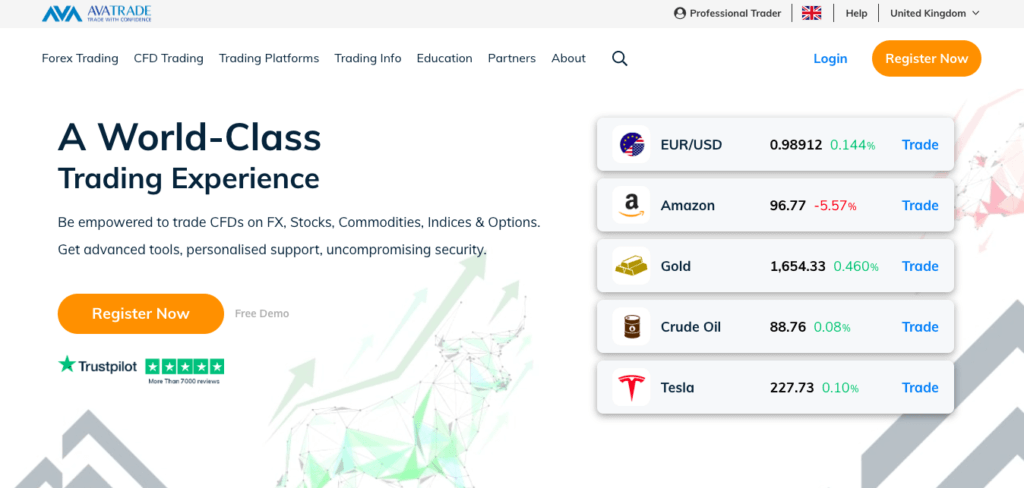
Pros
I absolutely love AvaTrade’s trading platforms, particularly the mobile version. The AvaTradeGo app is as clean and functional as you’ll find. It might not have quite as many charting options as you’ll find with Forex.com, but the navigation and trade execution process is flawless. AvaTradeGo makes forex trading incredibly simple.
Simple trade execution is one reason why I often recommend AvaTrade for new traders. Another reason is their outstanding educational programming, which includes hours of educational videos and tutorials on how to use the app (although it’s so intuitive you probably won’t need them), as well as daily blog posts and videos.
AvaTrade is also one of only two forex brokers (the other being IG) who seem to have actually made meaningful investments in their customer service department. Traders rave about AvaTrade’s knowledgeable staff and quick response time. My own experiences mirror the consensus—my interactions with them have led to very fast resolutions.
I keep track of the percentages of retail investor accounts that lose money trading CFDs (contracts for differences), a number that brokers are required to disclose. Of the 15 brokers I track, AvaTrade CFD traders are consistently among the most successful. (Successful is a relative term; even with AvaTrade more than two-thirds of all CFD accounts lose money.)
Does that mean your odds are better if you trade CFDs with AvaTrade rather than someone else? It’s impossible to say for certain since there are so many variables involved, but I think AvaTrade’s commitment to educating and protecting their traders is one reason they have comparable success.
One way AvaTrade protects their traders is through an innovative product they call AvaProtect. If you enact AvaProtect on a trade, it serves as an insurance policy that will reimburse you for any losses you might incur on that trade. There’s a small fee, but it’s well worth it, particularly if you’re trading on the go.
I would guess the costs of regulatory compliance in America have kept AvaTrade from expanding stateside, because they certainly aren’t fearful of the actual regulation. Last time I checked, AvaTrade was regulated in the EU, Japan, South Africa, Australia, and in a handful of other jurisdictions as well. They’re as safe as it gets.
Cons
AvaTrade is not available to traders in the United States. I was able to test them out through a demo account, and have friends abroad who use them, but unless they make a move to become regulated with the CFTC (Commodity Futures Trading Commission), Americans will continue to miss out. I had heard some rumblings of a US expansion, but as of right now, that seems like nothing more than wishful thinking.
As I mentioned above, as much as I love AvaTradeGo and AvaTrade’s web platform, they don’t offer quite as much charting functionality as Forex.com. If you’re a hardcore technical analyst and need a full tool belt of charting tools, AvaTrade probably isn’t your best bet.
AvaTrade has a reputation as a premium broker with premium prices. I’ve found their spreads to be comparable to other forex brokers, but your overall trading costs will probably be slightly lower with other brokers.
Overall
If you’re not located in the US, AvaTrade is a great option, particularly for new forex traders. Sign up here for outstanding customer service and educational resources plus the most straightforward, functional trading platforms in the industry.
#4 OANDA — 9.0/10
OANDA is a fast-growing broker offering their services to retail traders nearly worldwide. A fantastic mobile-trading app makes OANDA a great option for anyone who wants to trade forex on the go.
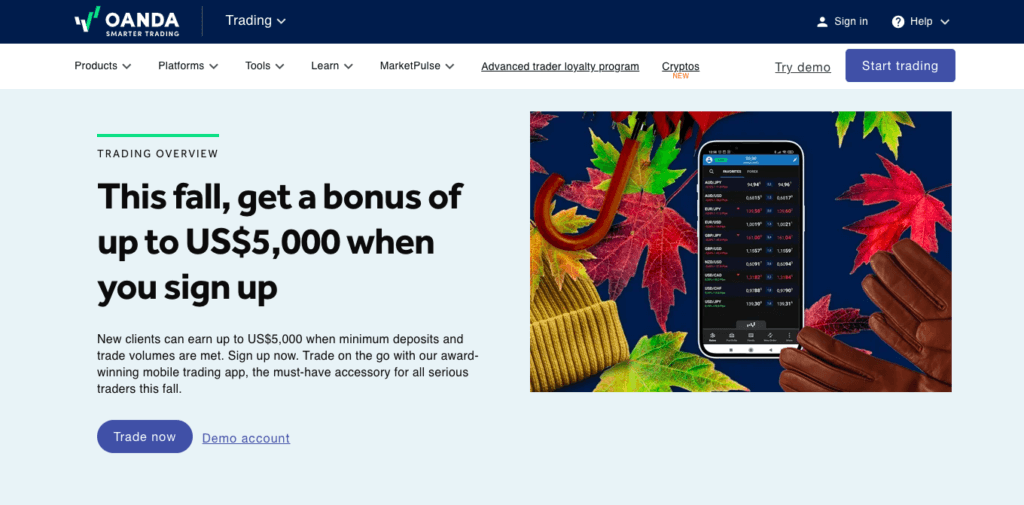
Pros
If you’re a US trader bummed that you can’t trade with AvaTrade, OANDA excels in a lot of the same areas, particularly when it comes to trading platforms. OANDA’s forex-trading app, fxTrade, is a really impressive bit of programming and my favorite choice if you plan to trade exclusively on the go.
OANDA has been an instrumental driver of change and innovation in the forex-broker industry. In 2001, they launched one of the first web-based trading platforms, and fxTrade was one of the first highly functional mobile forex-trading apps, debuting in 2013.
Their impressive experience shows both in the refined quality of their trading platforms and in their continual desire to push the envelope. As I write this, they are branching out into crypto trading in the US, and I’m always excited to see where OANDA goes next—they’re often several years ahead of the competition when it comes to innovation.
Because of these innovations, I always think of OANDA as the new kid on the block, but the truth is, they have been around for a long time. OANDA actually launched the same year as Google, if you can believe that. OANDA’s history, along with their adherence to the regulatory bodies of the US, Japan, the UK and more, make them as safe a broker as you can find.
Back to the mobile platform for a second, it reminds me of one of those perfectly designed camper vans. Every spare inch is functional and utilized. I can’t get over the simply presented information, analysis, and charting options. It’s a programming marvel.
It’s also entirely customizable. Spend just a little time with fxTrade or with the OANDA web-based platform, and you’ll have your own perfect platform. I really believe you have to be comfortable in your trading platform, and since OANDA gives you all the tools to build your own, it’s easy to cater everything to your specific trading needs.
I also love OANDA’s customer-service department, which has always been one of their strengths. Combine that with their impressive educational resources and OANDA is a great place for beginning forex traders to get their feet wet.
Cons
As I’ve mentioned, I typically just trade the major pairs, and honestly with the incredible volatility in the market of late, I haven’t had to look elsewhere for trading opportunities. In calmer markets, however, I do enjoy looking for trading opportunities in exotic pairs. To this end, OANDA is a bit of a letdown because they offer more than 10 fewer pairs than Forex.com and IG.
I’ve also noticed a tiny bit more slippage lately with OANDA than with a few other brokers. Not so much that I can say it’s definitely an ongoing issue, but just enough that I’m a little wary. However, they do offer guaranteed stop-loss orders on a lot of products, which eliminates those concerns entirely.
Truthfully, OANDA’s web app just doesn’t excite me as much as their mobile app. That might be saying more about fxTrade than it says about the web app, but I do wish they’d put a little more thought and resources into the web app.
Overall
OANDA is the best of both worlds—innovators with the experience and regulatory oversight to be amongst the safest forex brokers in the world. Sign up with OANDA if you want the best mobile trading platform, a commitment to customer service, and the promise that they’ll always be on the cutting edge.
#5 FxPro — 8.8/10
FxPro is available to just about everyone outside of the US. They’re one of the most popular brokers in the world and have won numerous awards for their trade execution, platforms, and overall performance.
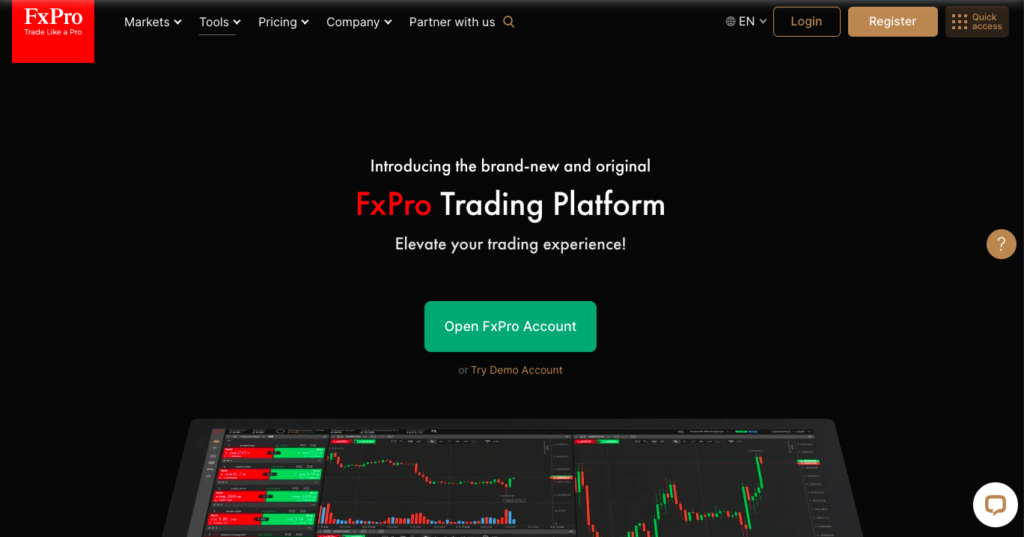
Pros
FxPro prides themselves on their execution speed, and indeed, I’ve never experienced significant slippage with them. They put their average trade speed at less than 14 milliseconds, which is pretty incredible.
One of the reasons they are so fast is that they have to be. FxPro handles a massive amount of trades from all over the world. During peak volume-trading times, they handle more than 7,000 trades a second.
FxPro is also famously ambitious, both in terms of their expansion worldwide and in terms of improving their product offerings. Although they’re not available in the US, FxPro has traders in 170 other countries and offers customer service in 21 different languages. This expansion is at least partially due to positive trader word of mouth, which really took off on social media when they announced lower spreads over the summer.
In terms of trading platforms, FxPro offers a lot of options. In addition to their proprietary mobile and web platforms, FxPro traders can use MT4, MT5, or cTrader. I’m not a huge fan of the FxPro mobile app, but their web platform is, to me, quite a bit better than the other options. Traders can also choose different account types to match their platforms in order to customize their trading conditions.
If you’re looking to trade beyond forex, FxPro offers CFDs in six different asset classes. I’m going to remind everyone here how careful you need to be when trading CFDs, but if you’re a CFD expert, FxPro offers a ton of options.
Cons
FxPro isn’t licensed in the US or in as many jurisdictions as the other brokers on this list. That certainly doesn’t mean they’re not safe—they’re rightfully considered one of the safest brokers in the world—but if you’re the type of person who bolts and locks six different locks on your door every night, you might be more comfortable with Forex.com or one of the other brokers.
If you’re considering FxPro because they offer an integrated cTrader account, know that you won’t have access to all the same assets as you would with the other platforms. cTrader accounts also carry commissions on some assets that are commission free elsewhere.
New traders would probably be better off with the educational resources offered by other forex brokers.
Overall
If you’re all about transaction speed and CFDs, FxPro is your best bet. They’re cheap, fast, and have a wealth of highly leveraged assets to trade.
#6 Interactive Brokers — 8.7/10
Interactive Brokers is an advanced broker for the professionals, with a wide array of tradable assets, the most complex trading tools, and some of the lowest costs in the industry.
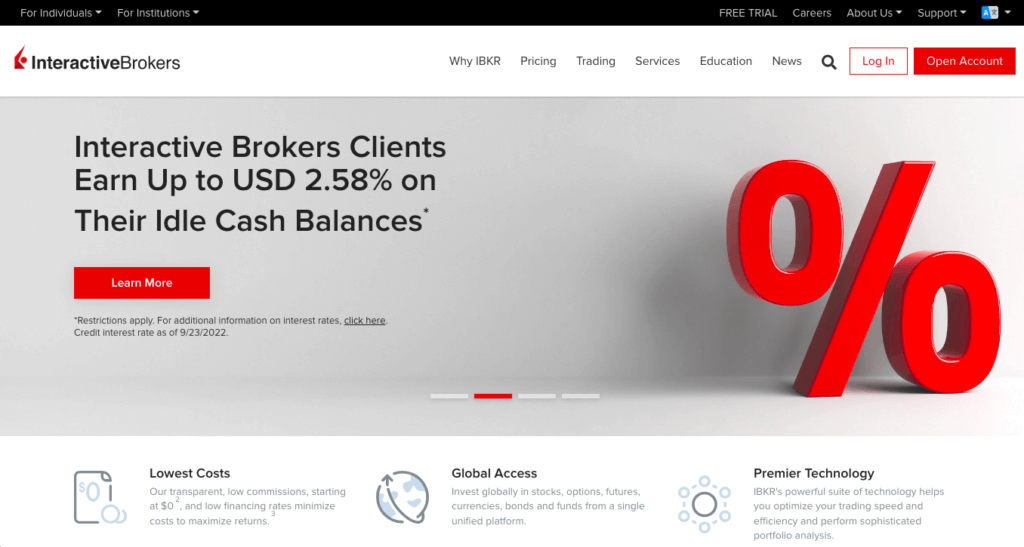
Pros
Interactive Brokers handles some of the largest accounts in the world. Hedge funds and other institutional investors trust their billions to Interactive Brokers. Why? It’s not because of their odd, stick-figure-mid-swim-stroke logo.
I’d guess there are two main reasons why most pros choose Interactive Brokers. The first has to be their competitive pricing across their various asset classes. Forex.com may beat them by a pip or two from time to time in the foreign-exchange market, but in terms of overall average trading costs across all their financial instruments, Interactive Brokers is probably the cheapest broker in the world.
The other reason Interactive Brokers is so popular with the biggest institutional investors is their security. Interactive Brokers is among the most regulated brokers in the world, maintaining compliance with more than 10 jurisdictions. Additionally, Interactive Brokers is traded on the NASDAQ, so their balance sheet is a matter of public record. Seven billion dollars worth of cash seems like an adequate rainy-day fund.
The trading platforms also seemed designed for professionals. Whoever was developing their platforms must have at some point asked, “How many indicators should we include in the mobile trading app?” The answer was simply, “All of them.” There’s no less than 60 indicators broken down into 10 categories.
All this is not to say that only professionals use Interactive Brokers. In fact, they have more than two million traders worldwide. That’s quite a bit more than the other forex brokers on this list. Could two million traders be wrong?
Cons
For my purposes, it’s all a bit too much. Yes, Interactive Brokers has accounts for retail traders like me, and yes, the fact that they provide professional charting options doesn’t mean I have to use them all, but I honestly feel in over my head.
Even their mobile-trading platform is designed for the pros. Most forex brokers make their mobile app for beginners, but Interactive Brokers themselves suggest you have an intermediate or advanced understanding of the markets to use their app.
Along those same lines, forex seems a little lost in the shuffle. You can access more than 150 global markets through Interactive Brokers. Futures, options, shares, bonds, crypto—you name it. That’s great if you want to trade a little bit of everything, but I prefer to focus my trading efforts on forex, and I prefer a broker that does the same.
Overall
If you are ready for truly professional-grade trading tools, sign up with Interactive Broker and join the millions of other traders worldwide.
Methodology: How to choose a forex broker
I always like to explain how I come about my rankings both because I’m a big fan of transparency and because I think my methodology presents a good blueprint to follow as you conduct your own research. Depending on your forex-trading strategy, some of these categories will be more relevant to you than others.
I started with a list of licensed forex brokers that are regulated in the US, UK, Australia, or Japan, as I consider these countries to have the most stringent financial regulatory bodies. I narrowed down this list to my top six by grading the brokers on a score of 1–10 according to the following eight factors.
Factor 1: Regulation
The forex brokers of the world can be separated into two categories: the regulated and the offshore “unregulated.” Unregulated brokers offer enormous leverage and products, such as CFDs that may not be offered in some jurisdictions. Regulated brokers, on the other hand, offer the peace of mind of knowing that they won’t go belly up taking your deposits and profits with them.
Obviously this article was only focused on regulated brokers, not the overall best forex brokers, so there wasn’t a whole lot of disparity in broker scores for this factor. Other than AvaTrade and FxPro, all my top choices are regulated by the CFTC and the NFA in the US, which are considered the gold standards for financial regulatory bodies.
Factor 2: Trading costs
Although they do occasionally have other fees, forex brokers typically make the bulk of their money through spreads and commissions. Commissions are very straightforward—a standard rate is charged per trade. Spreads can be a little more difficult to pin down because they vary according to different market conditions.
A lot of brokers are moving away from commissions and just profiting off of spreads, which are the differences between what a broker is selling a currency pair for and what they are buying the currency pair for.
There’s not a whole lot of variance amongst regulated brokers, but for high-volume traders, even slightly wider spreads can take a significant bite out of your overall profits.
For the sake of this article I graded the brokers on their spreads over a cross section of currency pairs, but if you trade one or two pairs exclusively, I suggest you look specifically at the spreads for those pairs. Most forex broker websites show current prices and spreads.
Factor 3: Proprietary trading platforms
If you really start looking at the details, there’s a surprising amount of variance from one trading platform to another. I tried to judge each platform as objectively as possible by looking at charting options, the integration of economic calendars, available analysis, and overall ease of use, amongst other things, but there’s a certain subjectivity involved as well.
Some platforms are just more appealing than others, which sounds glib, but if you’re trading hour after hour, you need a platform that doesn’t leave you itching to get up every few minutes. I recognize that what might be easy for my eyes might be the opposite for yours, so I strongly suggest you open demo accounts to test the trading platforms on your own. There’s also sometimes a lot of variance between a broker’s mobile trading app and their web-based platform, so be sure to check out both.
Almost every forex broker allows traders to use MT4, MT5, and/or another universal trading platform, so if you use one of those platforms, you probably want to ignore this factor. However, there have been some major issues with MT4 and MT5, and Apple is no longer making either available in their App store. I think it makes sense to look at a broker’s proprietary platform in case the MT4 era is soon over.
Factor 4: Number of currency pairs and other tradable assets
I typically stick to trading the major currency pairs, but I do like looking at exotic pairs for occasional trading opportunities, so for me, the more pairs the better. To rank the brokers in this category, I simply rated each broker according to how many pairs they offered. Forex.com and IG lead the way with more than 80 pairs. If you don’t plan on trading exotic pairs, you can ignore this factor entirely.
I also gave a slight rankings bump to those brokers who offered other tradable assets in addition to forex. OANDA, for example, just added crypto to their mix for US traders. I don’t trade crypto at the moment, but it is nice to have options.
Factor 5: Trade execution
Milliseconds. That’s how quickly forex trades are executed these days. The crazy thing is, a lot can happen in a millisecond! On an average day, $6.6 trillion is traded in the forex market. Forex is traded 24 hours a day, which means more than $76 million is being traded per second on average.
A slow broker on a volatile trading day can cost you money due to slippage. Slippage occurs when the price moves between when you make your order and when the order is actually fulfilled.
A lot of brokers publish their execution speed, which makes comparison easy, but I also used my own experience and noted which brokers seemed to have more slippage than others.
Factor 6: Educational and trading resources
You should be well versed in the forex market before you start trading forex, of course, but a lot of brokers offer great resources for beginning traders. Not only is it practical to learn with your broker, but good educational resources tell me that your broker is committed to helping its traders succeed in the long term.
More importantly to experienced traders, what type of resources does your broker add to help you on a daily basis? Daily market briefings, trade ideas, market spotlights, and economic calendars should all be a part of a comprehensive package that keeps you as informed as possible.
Factor 7: Ease of sign-up and withdrawals
This factor might seem insignificant—how hard can it be to sign up? Truth is, however, that thanks to regulated brokers’ adherence to KYC (Know Your Client) protocols, the identity verification part of the process can be a hassle.
For most traders this process is nearly instantaneous, but if, for whatever reason, your documents get flagged, you can be in for a lengthy review process. All registered brokers have to adhere to these same procedures, but some handle the hiccups better than others.
A delayed sign-up process can be frustrating but is nothing compared to the stress of waiting on a delayed withdrawal. It’s your money, after all—how can they hold on to it? Again, all forex brokers have to follow protocols before issuing funds. How quickly they get you through this process is what’s important.
I personally (knock on wood) have never had any issues with identity verification and have never experienced delayed withdrawals. To rate brokers in this category I relied on experiences of other traders I know, as well as online reviews.
Factor 8: Customer service
Customer service is important because when there are account issues, they are the front line. A good customer service department can mean the difference between a quick resolution to a withdrawal request that has been held up and a long, frustrating wait.
In my experience, the customer service departments that handle the small issues well are also the best at handling any significant problems. I interacted with customer service at a number of different brokers and ranked them based on response times and knowledgeability, and I threw in a small bonus for those that were particularly courteous.
Risks of trading foreign exchange
I’d be remiss if I didn’t remind everyone of the significant risks involved in forex trading. Yes, there are ways for intelligent traders to mitigate risk, but even the best traders can find themselves at the mercy of the market.
Factors such as inflation, interest rate intervention by government banks, the effects of a worldwide pandemic, and the Russian invasion of Ukraine have severely disrupted the forex market in recent years. This volatility has made some traders very wealthy, but it has also proven to be the undoing of some very good traders.
Be careful. Never trade with money you can’t afford to lose.
Best regulated forex brokers conclusion
The forex market is an incredible thing to behold. Nearly $7 trillion is traded per day. That’s nearly a third of the US annual GDP traded every single day. You’ll never completely master a market that size, but you’ve done your homework and you’re ready to carve out some of those profits for yourself.
Give yourself the best chance to succeed by opening an account with forex.com. Their excellent trading platforms, trading tools and educational resources will help tilt the odds in your favor.
